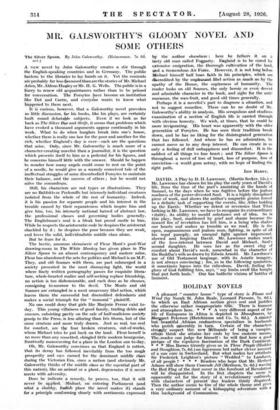DAVID. A Play by D. H. Lawrence. (Martin Seeker. 15s.)—
Mr. Lawrence. has chosen for his play_ the early years of David's life, from the time of the poet's anointing at the hands of Samuel, to the days when he was fugitive before the jealous madness of the power-divested Saul. It is a highly disciplined piece of work, and shows the author's magnetic genius forced to a definite task of supporting the events, like Atlas holding up the Earth:- Whether- we detest or reverence that Titan lurking in Mr. Lawrence, we have to recognize its extraordinary s itality, its ability to mould substance out of idea. So in this play, Saul, maddened by grief and shame because the inward fire of revelation has left him, is a being who shakes our hearts and makes us tremble as we read. He is the open, magnanimous and jealous man, fighting, in spite of all his regal panoply, an unequal . fight against impersonal. shrewd and forgiving David. Mr. Lawrence makes much of the love-interest between David and Michael, Saul's second daughter. He uses her as the sweet clog of comfort about David's neck, somewhat in the character of the Buddha's wife as drawn by Edwin Arnold. Mr. Lawrtnces use of Old Testament language, with its Asiatic imagery, is not always convincing.; for,.as in the following quotation, it sometimes lapses into the ridiculous. David. feeling the glory of God fulfilling him, says, " my limbs swell like boughs that riot forth buds." One has.-bathetic visions of bottles of liniment.






































 Previous page
Previous page